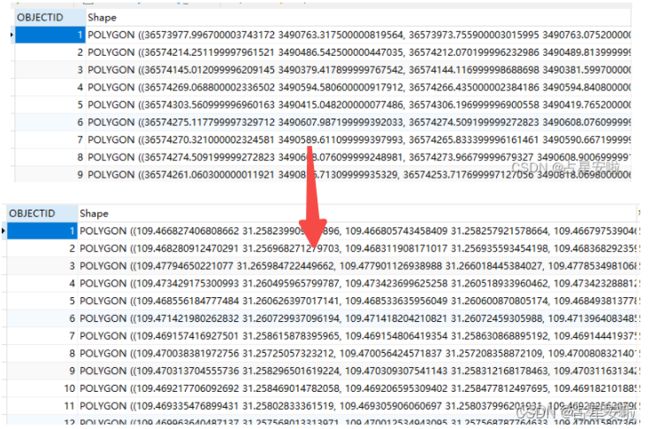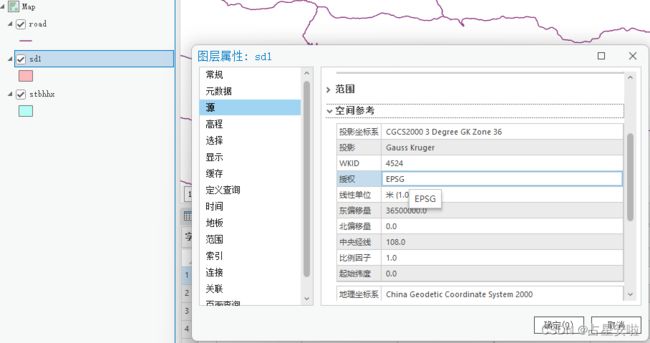坐标转换-使用geotools读取和转换地理空间表的坐标系(sqlserver、postgresql)
前言:
业务上通过GIS软件将空间数据导入到数据库时,因为不同的数据来源和软件设置,可能导入到数据库的空间表坐标系是各种各样的。
如果要把数据库空间表发布到geoserver并且统一坐标系,只是在geoserver单纯的设置坐标系只是改了定义并没有实际执行坐标转换,所以需要在数据库层面统一好坐标系,再发布到geoserver。

1,开发前准备
1.1,数据准备
要准备测试数据,可以参考 地理空间表的导入。
我这里使用arcgis pro导入sqlserver,如果导入postgresql需要企业数据库才行,也就是需要离线证书,比较麻烦。
我先导入一个4524的投影坐标,测试转换为4490

1.2,环境准备
坐标转换需要先读取数据库的空间表原坐标系,在根据原坐标系转换为目标坐标系。
使用的转换工具是geotool。
pom引入必要的依赖,geotools版本是24.3
org.geotools
gt-main
${geotools.version}
org.geotools
gt-jdbc
${geotools.version}
org.geotools.jdbc
gt-jdbc-sqlserver
${geotools.version}
org.geotools.jdbc
gt-jdbc-postgis
${geotools.version}
2,读取空间表原坐标系
要使用geotool读取空间表的坐标系,需要先使用geotool提供的方法创建DataStore,官网有一个示例代码
https://docs.geotools.org/latest/userguide/library/jdbc/sqlserver.html
java.util.Map params = new java.util.HashMap();
params.put( "dbtype", "sqlserver"); //(巨坑)
params.put( "host", "localhost");
params.put( "port", 4866);
params.put( "user", "geotools");
params.put( "passwd", "geotools");
DataStore dataStore=DataStoreFinder.getDataStore(params);
这是一个坑,官方说明是版本14之后支持Microsoft JDBC driver,dbtype应该就不需要使用jtds前缀了,实际上不加必报错
先写一个测试方法,传入数据库连接信息,表名,数据库类型,返回原表坐标系
import org.geotools.data.DataStore;
import org.geotools.data.DataStoreFinder;
import org.geotools.data.simple.SimpleFeatureSource;
import org.geotools.jdbc.JDBCDataStoreFactory;
import org.opengis.feature.simple.SimpleFeatureType;
import org.opengis.referencing.crs.CoordinateReferenceSystem;
public static int getEpsg(DatabaseConfig databaseConfig, String tableName) {
DataStore dataStore = null;
try {
Map params = new HashMap<>();
// params.put(JDBCDataStoreFactory.SCHEMA.key, "dbo");
if (DatabaseType.SQLSERVER.equals(databaseConfig.getDatabaseType())) {
params.put(JDBCDataStoreFactory.DBTYPE.key, "jtds-sqlserver");
} else {
params.put(JDBCDataStoreFactory.DBTYPE.key, "jtds-postgis");
}
params.put(JDBCDataStoreFactory.HOST.key, databaseConfig.getHost());
params.put(JDBCDataStoreFactory.PORT.key, databaseConfig.getPort());
params.put(JDBCDataStoreFactory.DATABASE.key, databaseConfig.getDatabaseName());
params.put(JDBCDataStoreFactory.USER.key, databaseConfig.getUsername());
params.put(JDBCDataStoreFactory.PASSWD.key, databaseConfig.getPassword());
dataStore = DataStoreFinder.getDataStore(params);
if (dataStore == null) {
System.out.println("Failed to connect to the database.");
return -1;
}
// Get the feature source for the "aa" table
SimpleFeatureSource featureSource = dataStore.getFeatureSource(tableName);
// Get the feature type and its CRS
SimpleFeatureType featureType = featureSource.getSchema();
CoordinateReferenceSystem crs = featureType.getCoordinateReferenceSystem();
// Print the CRS details
if (crs != null) {
System.out.println("Spatial Reference System: " + crs.getName());
System.out.println("EPSG Code: " + crs.getName().getCode());
System.out.println("crs : " + crs.toString());
//抽取原表坐标系
int result = extractEPSG(crs.toString());
System.out.println("Result: " + result);
return result;
}
// Close the data store
dataStore.dispose();
return 0;
} catch (IOException e) {
log.error("查询空间表坐标系异常:{}", e.toString());
return -1;
} finally {
if (dataStore != null) {
dataStore.dispose();
}
}
}
然后看一下解析出来坐标信息
Spatial Reference System: EPSG:CGCS2000 / 3-degree Gauss-Kruger zone 36
EPSG Code: CGCS2000 / 3-degree Gauss-Kruger zone 36
crs : PROJCS["CGCS2000 / 3-degree Gauss-Kruger zone 36",
GEOGCS["China Geodetic Coordinate System 2000",
DATUM["China 2000",
SPHEROID["CGCS2000", 6378137.0, 298.257222101, AUTHORITY["EPSG","1024"]],
AUTHORITY["EPSG","1043"]],
PRIMEM["Greenwich", 0.0, AUTHORITY["EPSG","8901"]],
UNIT["degree", 0.017453292519943295],
AXIS["Geodetic latitude", NORTH],
AXIS["Geodetic longitude", EAST],
AUTHORITY["EPSG","4490"]],
PROJECTION["Transverse_Mercator", AUTHORITY["EPSG","9807"]],
PARAMETER["central_meridian", 108.0],
PARAMETER["latitude_of_origin", 0.0],
PARAMETER["scale_factor", 1.0],
PARAMETER["false_easting", 36500000.0],
PARAMETER["false_northing", 0.0],
UNIT["m", 1.0],
AXIS["Northing", NORTH],
AXIS["Easting", EAST],
AUTHORITY["EPSG","4524"]]
我想要的是之前我们在arcgis pro中看到的投影坐标,位于crs信息的最后一个EPSG内,针对crs信息写一个方法解析出epsg
public static int extractEPSG(String input) {
Pattern pattern = Pattern.compile("AUTHORITY\\[\"EPSG\",\"(\\d+)\"\\]");
Matcher matcher = pattern.matcher(input);
int lastEPSG = 0;
while (matcher.find()) {
lastEPSG = Integer.parseInt(matcher.group(1));
}
return lastEPSG;
}
3,执行坐标转换
我这里目标坐标系写死,因为系统需要插入到sqlserver中的都要统一坐标系,所以直接在原表更新了。
如果要保留原表信息可以复制表在副本表更新坐标。
sqlserver与postgresql中空间函数有些差异,需要区分处理。
/**
* 地理空间表坐标转换
*
* @param sourceEpsg 原表坐标系
* @param config 数据库连接信息
* @param tableName 表名 dbo.ROAD
* @param geometryColumn 空间字段
*/
public static void epsgTo4490(int sourceEpsg, DatabaseConfig config, String tableName, String geometryColumn) {
String sourceEPSG = "EPSG:" + sourceEpsg;
String targetEPSG = "EPSG:4490";
ResultSet resultSet = null;
try (Connection connection = DatabaseConnection.getConnection(config)) {
//拼接sql
String sql;
if (config.getDatabaseType().SQLSERVER.equals(config.getDatabaseType())) {
sql = "SELECT " + geometryColumn + ".STAsText() as Shape,OBJECTID FROM " + tableName;
} else {
//ST_AsText(columns)
sql = "SELECT ST_AsText(" + geometryColumn + ") as Shape,OBJECTID FROM " + tableName;
}
// 使用连接执行 SQL 查询操作
PreparedStatement statement = connection.prepareStatement(sql);
resultSet = statement.executeQuery();
// Create MathTransform
CRSFactory crsFactory = new CRSFactory();
org.osgeo.proj4j.CoordinateReferenceSystem sourceCRS = crsFactory.createFromName(sourceEPSG);
org.osgeo.proj4j.CoordinateReferenceSystem targetCRS = crsFactory.createFromName(targetEPSG);
CoordinateTransformFactory transformFactory = new CoordinateTransformFactory();
CoordinateTransform transform = transformFactory.createTransform(sourceCRS, targetCRS);
// Process each row of the result set
while (resultSet.next()) {
String shape = resultSet.getString("Shape");
int objectId = resultSet.getInt("OBJECTID");
// Convert the string representation of the geometry to a JTS Geometry object
WKTReader reader = new WKTReader();
Geometry geometry = reader.read(shape);
// Perform the coordinate transformation for each coordinate in the geometry
for (int i = 0; i < geometry.getCoordinates().length; i++) {
Coordinate srcCoord = geometry.getCoordinates()[i];
ProjCoordinate targetCoord = new ProjCoordinate(srcCoord.getX(), srcCoord.getY());
transform.transform(targetCoord, targetCoord); // 将源坐标转换为目标坐标,并保存在 targetCoord 中
srcCoord.setX(targetCoord.x);
srcCoord.setY(targetCoord.y);
}
// Convert the transformed geometry back to a string
WKTWriter writer = new WKTWriter();
String transformedShape = writer.write(geometry);
// Update the original table with the transformed geometry using the primary key
String updateSQL;
if (DatabaseType.SQLSERVER.equals(config.getDatabaseType())) {
updateSQL = "UPDATE " + tableName + " SET " + geometryColumn + " = ? WHERE OBJECTID = ?";
} else {
//UPDATE "public"."ROAD" SET Shape = ST_SetSRID(ST_GeomFromText("Shape"), 4490);
updateSQL = "UPDATE " + tableName + " SET " + geometryColumn + " = ST_SetSRID(?,4490) WHERE OBJECTID = ?";
}
statement = connection.prepareStatement(updateSQL);
statement.setString(1, transformedShape);
statement.setInt(2, objectId);
statement.executeUpdate();
statement.clearParameters();
}
if (DatabaseType.SQLSERVER.equals(config.getDatabaseType())) {
//修复多边形错误 UPDATE dbo.ROAD SET Shape = Shape.MakeValid()
String updateSQL = "UPDATE " + tableName + " SET " + geometryColumn + " = " + geometryColumn + ".MakeValid()";
statement = connection.prepareStatement(updateSQL);
statement.executeUpdate();
//指定坐标系 UPDATE dbo.ROAD SET Shape.STSrid=4490
updateSQL = "UPDATE " + tableName + " SET " + geometryColumn + ".STSrid=4490";
statement = connection.prepareStatement(updateSQL);
statement.executeUpdate();
}
// Close the resources
statement.close();
resultSet.close();
} catch (SQLException e) {
log.error("坐标转换中sql执行异常:{}", e.getMessage());
} catch (ParseException e) {
log.error("坐标转换中异常:{}", e.getMessage());
}
}
上述代码只是sqlservcer亲测多种坐标系转换正常,且转换后的表发布到geoserver和arcgis都能正常预览且聚焦位置正确,postgresql还有待测试
4,单元测试
public static void main(String[] args) throws SQLException {
String tableName = "ROAD";
//测试sqlserver
DatabaseConfig databaseConfig = new DatabaseConfig(DatabaseType.SQLSERVER, "127.0.0.1", 1433, "测试中文数据库", "sa", "xxxx");
//测试postgresql
//DatabaseConfig databaseConfig = new DatabaseConfig(DatabaseType.POSTGRESQL, "127.0.0.1", 5432, "postgis20", "postgres", "xxxxxxx");
int sourceEpsg = TableEpsgUtil.getEpsg(databaseConfig, tableName);
System.out.println("原表坐标:" + sourceEpsg);
//如果获取到原表坐标并且不是4490,则执行转换
if (sourceEpsg > 0 && sourceEpsg != 4490) {
epsgTo4490(sourceEpsg, databaseConfig, tableName, "Shape");
System.out.println("坐标转换完成");
}
}